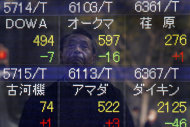Greece is like a drowning man who is negotiating with his potential saviors. Once they agree to a price, the price goes up. So it is with the Eurozone and the Greek people. In the following AP posting, we read the following:
"Investors breathed a sigh of relief that the agreement would allow Greece to get a euro130 billion ($173 billion) bailout package and avoid a bankruptcy next month that could send shockwaves around the financial markets.
But finance ministers from the other 16 eurozone states threw a spanner in the works late Thursday and insisted that Greece had to save an extra euro325 million ($430 million), pass the cuts through a restive parliament and guarantee in writing that they will be implemented even after planned elections in April."
So if Greece agrees to this additional $430 million and other guarantees, will the issue be over? One would hardly think so. It appears they are playing with Greece as a cat plays with a mouse. Is the game-plan a takeover of Greece as we had earlier pontificated? Or are the finance ministers serious. We hope for the latter but still think the prior may be the plan. All Europeans love to go on "holiday" and wouldn't owning Greece be wonderful!
As far as the cuts go, they are serious. From the same article:
Our response is -- wow! This is serious! We find it interesting they are cutting private sector wages, how does that factor into government spending and debt? Would not those wages pay the taxes that are needed to pay off the debt, or am I missing something here?
We would have no problem with civil service layoffs or reductions in health spending but social security and military is another issue. How is Greece to defend itself if their military is significantly cut. Will the Turks or Italians invade? Hasn't the Greek people been paying into Social Security for years? How does one justify a cut here?
But rest your mind, it is only Greece and their debt problem is so much worse than ours, right? Wrong. Their debt to GDP ratio is approximately 160% and the United States looks like a piker with only 100% . However, given the spending trajectory we are on, we can reach Greece's lofty level in a year or two. Then what happens?
We suspect the world will not be as generous to us as they have been to Greece. There are multiple outcomes, none of which will be good for the US. Definitely salary cuts, layoffs of public sector, major cuts in social programs, social security and medicare would be expected. Strict limitations on health care expenditures under ObamaCare including dollar limits and definite age limits on both sides of the age continuum. Lastly, major increases in all taxes should be expected. Gas taxes would triple or more and income taxes and sales taxes will at least double.
Military spending would be cut by 3/4 effectively removing our ability to be a stabilizing force in the world. Most worldwide commitments would be jettisoned. Spending on new military hardware would be curtailed and replacement parts would be limited to 1/2 prior levels.
The one area that would have little change would be foreign aid. The one exception would be that all money going to Israel would be eliminated.
No, it will not be a pretty picture. Who is to blame? George W, for sure!
Are we crazy? You tell us.
Conservative (Crazy) Tom
Greek deal limbo weighs on markets


No comments:
Post a Comment
Thanks for commenting. Your comments are needed for helping to improve the discussion.